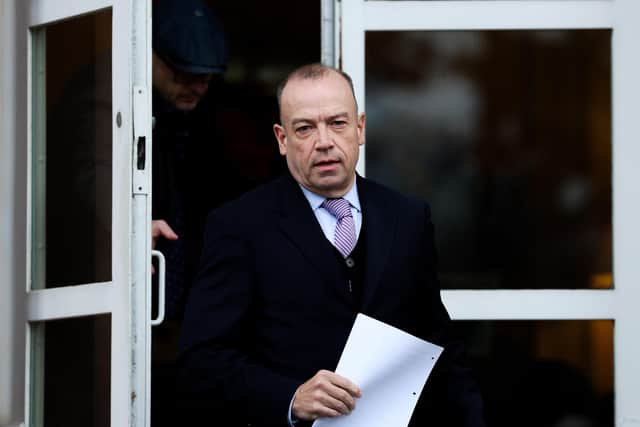'Sufficient' new deadline for Stormont restoration - as TUV accuse government of trying to bounce unionists
and live on Freeview channel 276
A previous deadline to call an election for the Northern Ireland Assembly passed last week. The new legislation will extend it until February 8th.
The government announced that the “very short” bill will be discussed on Wednesday.
A DUP spokesperson said,
Advertisement
Hide AdAdvertisement
Hide Ad

“The introduction of this Bill by the Secretary of State is recognition that, whilst significant progress has been made, to date an agreement has not been reached.
We will continue to engage with the Government as we seek to successfully finalise all the remaining outstanding issues between us. We are working to that end. The Government knows our view that it is only when we have resolved the remaining outstanding issues that we will be able to bring about the necessary conditions for the return of devolved Government.”
A DUP spokesperson said the bill is recognition that “whilst significant progress has been made, to date an agreement has not been reached.
The party said it would continue to engage with the Government to finalise all the remaining outstanding issues, and added that it is only when those issues are resolved “that we will be able to bring about the necessary conditions for the return of devolved Government.”
Advertisement
Hide AdAdvertisement
Hide AdJim Allister says it is an attempt to push unionists into a decision to accept the Irish Sea border.
The TUV leader said: “The setting of the 8th February deadline by the Government amounts to another attempt to bounce Unionists into submission to the pernicious Protocol. Nothing has changed so it requires and deserves the same response: Protocol or Stormont, not both.”
The Labour Party said the situation was not ideal. However, Shadow Commons leader Lucy Powell said: “Labour shares the Government’s desire to see an executive restored as soon as possible and we recognise that if extending the deadline for elections to be called is the best way to achieve that, which it seems to be, then we will of course fully support that.”
In a statement to the media yesterday NI Secretary Chris Heaton-Harris said: “The Bill only has a single clause: to extend the period of time Stormont can legitimately come back until the 8th February. I am committed to restoring devolution and significant progress has been made towards that objective. I believe that this Bill, with the constrained timescales, will be sufficient.”
Advertisement
Hide AdAdvertisement
Hide AdThe SDLP say they will seek to amend the legislation to reform the process for electing an Assembly Speaker to a two-thirds majority, “removing the one-party veto on the re-establishment of the Assembly”. The party’s two MPs will also submit an amendment to place an obligation on the Secretary of State to deliver a pay award for public sector workers in the absence of Stormont.
SDLP leader Colum Eastwood MP said: “People are beyond sick of hearing the same old statements about progress in the exclusive negotiations between the DUP and the British Government with nothing to show for it. The hard reality is that the only thing they’ve delivered is worse living standards for people across the North, an unprecedented period of industrial action and the further erosion of public services. Enough is enough”.
If an Executive is not formed within the new deadline – steps may be taken to formalise decision making in the absence of Stormont ministers.
Commenting last week after Stormont failed to elect a speaker, Chris Heaton-Harris said: “In the absence of an executive, the government will proceed with a pragmatic and reasonable approach to support Northern Ireland.”
Advertisement
Hide AdAdvertisement
Hide AdThe government has ruled out joint authority and the form of direct rule seen in the past under New Labour – where ministers were put in place and Northern Ireland was run through the NIO.
UUP leader Doug Beattie told the News Letter at the weekend that he’d been told by the NIO that the governance of Northern Ireland may now involve “an unelected committee comprising Northern Ireland Civil Service permanent secretaries and UK government officials from various sectors. This arrangement would be part of primary legislation at Westminster, necessitating action by the secretary of state, as the Executive Formation Bill's January 18 deadline has passed”.
The Upper Bann MLA added: “Northern Ireland would then be governed by an unelected committee, raising questions about influence, scrutiny, transparency, and decision-making processes. While the outcomes may be visible, the process leading to those decisions may remain undisclosed.”
Alliance leader Naomi Long has said neither direct rule nor an Irish government role in running Northern Ireland would be compatible with the Good Friday Agreement.
Advertisement
Hide AdAdvertisement
Hide AdHer deputy, North Down MP Stephen Farry said there would be no choice but for a role for the Irish government in any ‘Plan B’ arrangements – but that it would be a consultative rather than an executive role for Dublin.
Although ruled out by government – the idea of joint authority was floated by the Tory chair of the NI Affairs Committee Sir Robert Buckland in recent weeks. The DUP described Sir Robert’s intervention as a “hollow threat”. Deputy leader Gavin Robinson said the Republic of Ireland has no legal basis for governing Northern Ireland.
The East Belfast MP said: “Such a step would be a further breach of the Belfast and successor agreements.”
He said it was the arrangements flowing from the Northern Ireland Protocol alone that are stopping the formation of an executive.
Advertisement
Hide AdAdvertisement
Hide AdMr Robinson said: “Replacing the protocol with arrangements that unionists, as well as nationalists can support, will provide a solid foundation for the restoration of devolution on a cross community basis.”
Comment Guidelines
National World encourages reader discussion on our stories. User feedback, insights and back-and-forth exchanges add a rich layer of context to reporting. Please review our Community Guidelines before commenting.